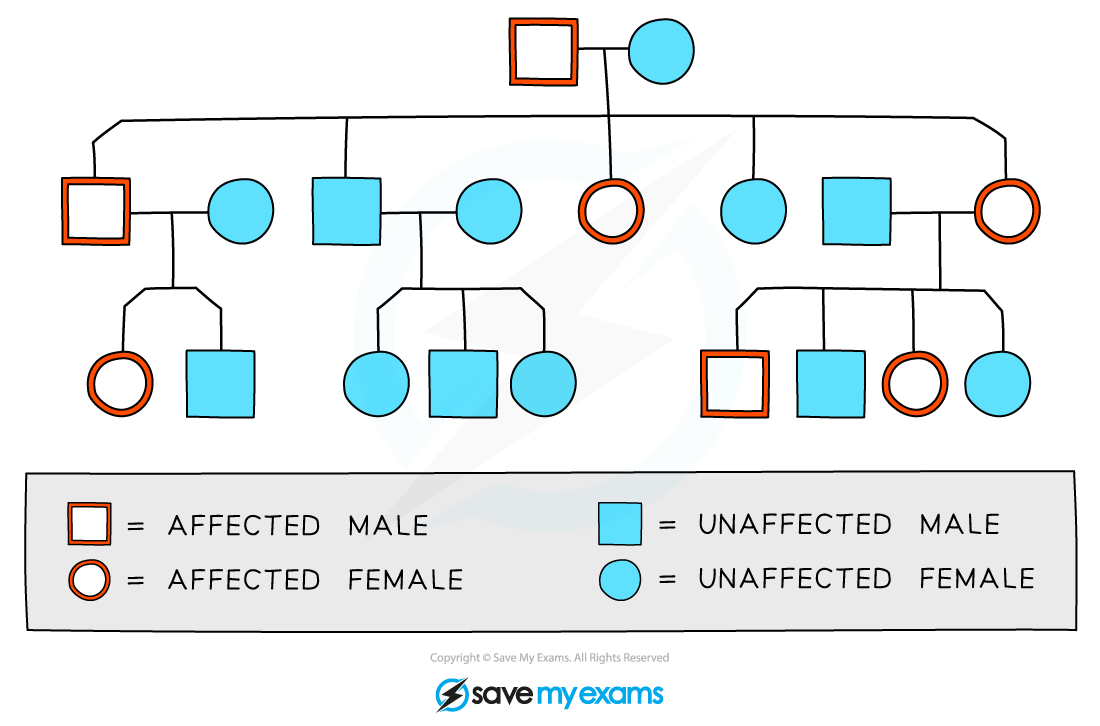Pedigree Charts (DP IB Biology): Revision Note
Pedigree Charts
Family pedigree diagrams are usually used to trace the pattern of inheritance of a specific characteristic (usually a disease) through generations of a family
This can be used to work out the probability that someone in the family will inherit the genetic disorder
Pedigree chart diagram

A family pedigree chart
Males are indicated by the square shape and females are represented by circles
In this diagram, affected individuals are red and unaffected are blue
Shading or cross-hatching may also be used to show affected individuals
Horizontal lines between males and females show that they have produced children (which are linked underneath each couple)
Roman numerals may be used to indicate generations
For each generation the eldest child is on the left and each individual is numbered
The family pedigree above shows:
Both males and females are affected
Every generation has affected individuals
The eldest son (in the second generation) is affected
That there is one family group that has no affected parents or children
The other two families have one affected parent and affected children as well
The study of pedigree charts provides an opportunity to appreciate why marriage between close relatives is prohibited in many countries
Reproducing with close relatives increases the chance that both individuals possess harmful recessive alleles that can be passed onto the offspring
This causes the offspring to have a much higher chance of inheriting genetic diseases
Worked Example
Worked example: Pedigree charts
Below is a pedigree chart which traces the inheritance of albinism across several generations. Albinism affects the production of the pigment melanin leading to lighter hair, skin and eyes.

Using the pedigree chart, deduce and explain the following:
What type of allele causes albinism?
The genotype of individuals named 9 and 7
The possible genotypes of 10 and 11
Albinism is caused by a recessive allele
Explanation: We can tell this from the pedigree chart because expression of the disease skips generation II. Also, person number 9 is an affected individual despite his parents (6 and 7) being unaffected. 6 and 7 must both be carriers of the recessive allele and 9 has inherited one recessive allele from each parent.
It is unlikely to be a sex-linked disease as both females and males have the condition
The genotype of person 9 must be homozygous recessive (aa) and the genotype of 7 must be heterozygous (Aa)
Explanation: 9 is an affected individual with albinism (which is determined by the recessive allele). 7 must be heterozygous in order for him to pass on the recessive allele to person 9
The possible genotypes of 10 and 11 are heterozygous (Aa) or homozygous dominant (AA)
Explanation: This is because they are unaffected individuals so must possess at least one dominant allele (A), however, it is possible that they each inherited a dominant allele from each parent
Examiner Tips and Tricks
When answering questions about pedigree charts for genetic diseases, it is always useful to remember which phenotype is caused by the recessive allele. You can write these genotypes onto your chart and it will give you a good starting point for working out the possible genotypes of the rest of the individuals in the chart.
NOS: Scientists draw general conclusions by inductive reasoning
Inductive reasoning is the idea of making generalised conclusions based on specific evidence taken from a small sample
For example, we could observe a sample of evidence from a pedigree chart and if that observation deviated from what we would expect we could surmise that the condition could be sex-linked
Deductive reasoning is making specific deductions about something unknown based on known evidence
For example, if two non-affected parents have a child that is affected by a genetic condition we can deduce that the condition is caused by a recessive allele, and that the parents are both carriers of the allele

Unlock more, it's free!
Was this revision note helpful?
